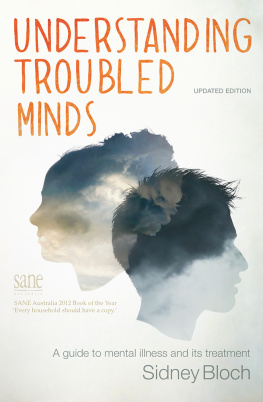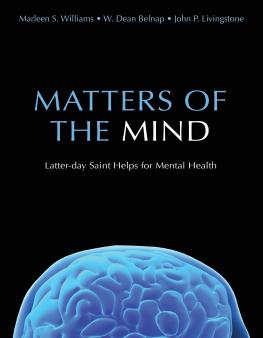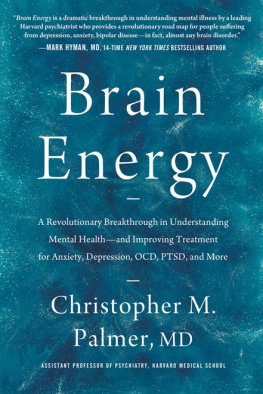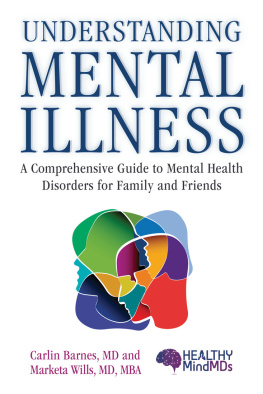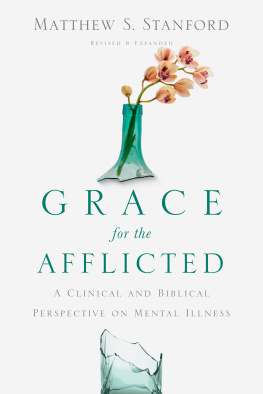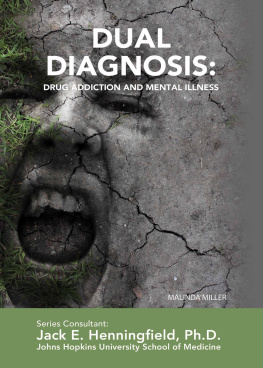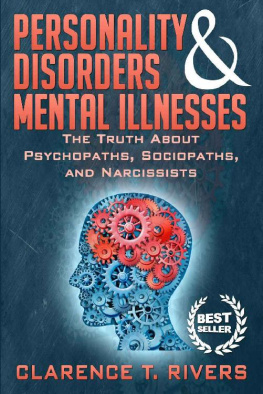A Select Guide to Further Reading
In mulling over how to compile this list, I toyed with various options, including one book for each psychiatric condition, a formal set of texts covering every topic, poignant accounts by patients or their families, and material prepared by self-help organisations. Rather than bombarding you with lengthy lists, let me offer a personal selection based on what I have found helpful or illuminating. I hope it will prove equally so for you.
I must immediately point out that books are but one means of acquiring information and knowledge. A range of other mediafilm, television, radio and the internetare equally rich sources, with the latter steadily overtaking the other forms. Anyone with access to the web can readily locate sites providing topical and useful information about all aspects of mental health, but it is wise to remember that many contributions are of dubious quality. Try to stick to established government and self-help organisations. An excellent example is the website of the National Institute of Mental Health, the pre-eminent research organisation of the United States government, which offers a comprehensive account of developments in psychiatry (www.nimh.nih.gov).
This sort of material is widely available nowadays, its introduction having been spurred on by the advent of the self-help movement. A host of mental health organisations see the preparation and dissemination of information in the form of booklets and manuals as a core function. The organisations themselves are easily reached through the family doctor, psychiatric clinic, telephone directory and the internet. Their material is generally informative and user-friendly.
Let us now turn to books that I have valued over the years. The first group centres around personal experience of mental illness, through the eyes of patients, relatives or observers. Sometimes, therapists have linked up with patients or relatives. And some observers go beyond the clinical story and provide advice and guidance on how to deal with a particular mental illness.
Of what we might call testimonial literature, this is only the tip of an iceberg:
Anne Deveson, Tell Me Im Here , Penguin, Melbourne, 1991. The well-known Australian broadcaster and filmmaker relates her poignant story of battling to help her son, Jonathan, to survive the torment of schizophrenia.
Janet Frame, An Autobiography , Random House, Auckland, 1994. A trilogy by the New Zealand writer who spent many years in a mental hospital; the film An Angel at My Table is a brilliantly directed rendering of her experience.
Hannah Green, I Never Promised You a Rose Garden , Holt, Rinehart and Winston, New York, 1964. The account of the psychotherapy of a psychotic young woman.
Kay Redfield Jamison, An Unquiet Mind , Knopf, New York, 1995. A psychologists personal battle with manic-depressive illness.
, Night Falls Fast: Understanding Suicide , Knopf, New York, 1999. A comprehensive account of suicide, especially in young people.
Sandy Jeffs, Flying with Paper Wings , Vulgar Press, Melbourne, 2009. A vivid account of a longstanding schizophrenic experience by an accomplished poet.
David Karp, Speaking of Sadness , Oxford University Press, New York, 1996. Personal testimony of an American sociologist, and material from his interviews of fifty other people who have experienced depression.
Spike Milligan and Anthony Clare, Depression and How to Survive It , Arrow, London, 1994, A collaboration between the famous British comedian and a professor of psychiatry; Milligan is searingly honest about his four decades of disordered mood.
Judith Rapoport, The Boy Who Couldnt Stop Washing , Dutton, New York, 1989. Patients and their families share their experiences of suffering from, or living with, a sufferer of obsessive-compulsive disorder.
Kate Richards, Madness: A Memoir , Penguin, Melbourne, 2013. A doctor courageously shares her story of pyschosis and depression.
William Styron, Darkness Visible , Jonathan Cape, London, 1991. The American novelists vivid description of his devastating descent into depression.
Fuller Torrey, Surviving Schizophrenia , Quill, New York, 2006. A psychiatrists effort to convey his patients experiences of schizophrenia, coupled with a description of the disorder and its treatment.
Irvin Yalom, Loves Executioner , Basic Books, New York, 1989, A psychiatrist conveys most vividly the psychotherapy he conducted with ten of his patients.
For details of the life of Vincent Van Gogh, which has been highlighted and is of enduring interest, see:
D Sweetman, Love of Many Things: A Life of Vincent Van Gogh , Hodder and Stoughton, London, 1990.
ME Tralbaut, Vincent Van Gogh , Viking, New York,1969.
V Van Gogh, The Complete Letters of Vincent Van Gogh , Thames and Hudson, London, 1958.
www.vggallery.com is a website very much worth a look.
I highlighted in the Preface the contribution of great writers to deepening our understanding of mental illness. Indeed, among the most sensitive and astute observers of human nature are novelists, poets and dramatists. As with the testimonial literature, examples here are unlimited, but noteworthy are Shakespeares King Lear , Macbeth and Hamlet , Chekhovs Uncle Vanya , Balzacs Louis Lambert , Flauberts Madame Bovary , Hardys Far From the Madding Crowd , Scott Fitzgeralds Tender Is the Night , Ken Keseys One Flew Over the Cuckoos Nest , Sylvia Plaths The Bell Jar , DM Thomass The White Hotel , Sebastian Barrys The Secret Scripture , Philip Roths Patrimony and Pat Barkers Regeneration trilogy.
You may seek a more scientific account of an aspect of psychiatry. I hesitate to recommend formal textbooks since they are obviously technical, commonly laden with jargon and, given their need to be objective, the human dimension tends to be overshadowed by hard scientific data. Bearing this in mind, two texts are popular among psychiatrists and regarded as authoritative. The most commonly quoted American text is the Comprehensive Textbook of Psychiatry , edited by B Sadock and colleagues (9th edition, Lippincott, Williams and Wilkins, Baltimore, 2009). Another widely used reference is the New Oxford Textbook of Psychiatry by M Gelder and colleagues (2nd edition, Oxford University Press, Oxford, 2009).
To these must be added what psychiatrists have come to adopt as classics. They include the work of obvious figures like Freud and Jung. A handy compilation of Freuds main writings is The Freud Reader , edited and introduced by Peter Gay (1989). Selected writings of Jung were brought together by Anthony Storr and published as a pocket reader, The Essential Jung (1983).
Another classic is Mans Search for Meaning by the Viennese psychiatrist, Viktor Frankl (1962). The British psychiatrist and psychoanalyst, John Bowlby, devoted almost his entire career to preparing a trilogy entitled Attachment and Loss (196980); the books cover key themes like loss, sadness and depression. I have been very much influenced by another psychoanalyst, Erik Erikson, whom I have mentioned as the developer of the notion of stages of psychological development throughout the life cycle. Childhood and Society (1963) is one of his several classics.
Other contributions that have attracted the attention of psychiatrists include Arthur Kleinmans Rethinking Psychiatry (1988), in which he highlights the relevance of a cross-cultural perspective for mental health practice, a counterweight to the pendular swing towards the biological emphasis since the 1990s. Erving Goffman, in his book Asylums (1961), also adopts a social science approach when examining the social circumstances of the mentally ill in institutions. Another Goffman classic is Stigma (1964).
If you are interested in the history of psychiatry you have a broad choice. I would recommend The Faber Book of Madness , edited by Roy Porter (1991), an anthology covering a vast panorama. A more focused book by the French scholar Michel Foucault, Madness and Civilization (1965), attempts to explain the history of insanity from 1500 to 1800.

